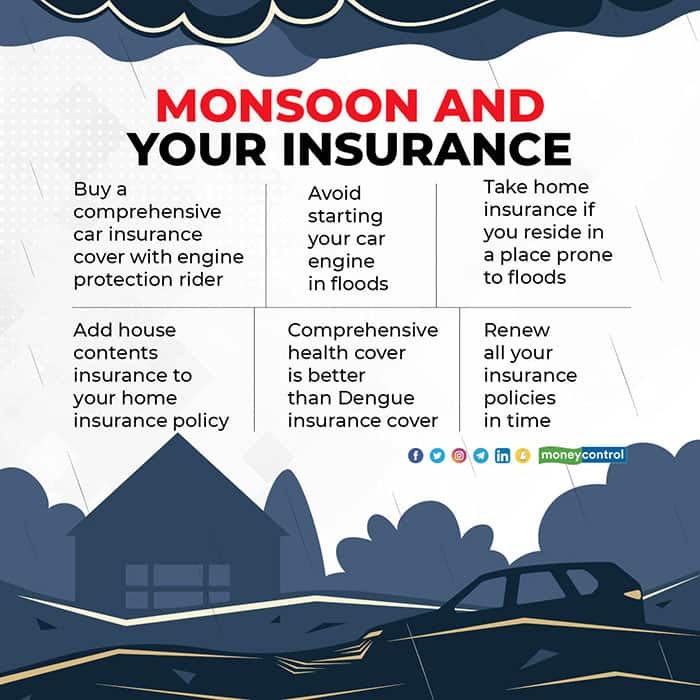- Home
- Know Us
- Our Services
- Products
- Non Life Insurance
- Loans


Latest articles on Life Insurance, Non-life Insurance, Mutual Funds, Bonds, Small Saving Schemes and Personal Finance to help you make well-informed money decisions.
Insurance policies that cover your house, vehicle, and health are critical to avoid incurring unnecessary expenses due to monsoon flooding.
Cyclones Tauktae and Yaas hit India’s west and east coasts, respectively, before the monsoon started officially. The damages caused should act as a reminder call for all of us to be monsoon-ready. But many may have found it difficult to act given restrictions on movements then. As COVID-19 restrictions get lifted gradually and the monsoon gets active again after a lull, this could be a good chance to review your insurance coverage and be monsoon ready.
Motor and home insurance
Lockdowns, medical emergencies, and loss of income have taken a toll on the finances of many individuals. But it is high time you review your insurance covers again. If you haven’t bought adequate covers or forgotten to renew your old insurance policies, it is time to buy them afresh.

To make sure you are completely secure from the monsoon onslaught, you need to ensure that your house and vehicle are secured as well. Comprehensive health, house, and motor insurance cover shield you from any monsoon disaster and damage.
Some of us contemplate returning to the office soon, after getting fully vaccinated. However, many want to purchase a vehicle for daily commute instead of taking public transport so as to avoid the crowd. If so, buy your motor insurance policy carefully.
“Traditional comprehensive motor insurance policies pay for damage caused by flood to the engine parts and other losses. But they do not cover damage to the engine if you try to switch on the car if it is stuck in a flooded area,” says Saroj Kanta Satpathy, Chief Operating Officer, J B Boda Insurance & Reinsurance Brokers. While buying a new car, purchase a zero-depreciation motor insurance policy along with an engine protection rider, to protect yourself against such an eventuality.
Even if you have to drive in waterlogged areas, drive slowly at low speed so that the chances of water ingress in the engine are avoided. In the case of a vehicle being submerged in the water, one should never try to constantly crank up the engine to avoid further movement of water into any of the internal parts. This will lead to minimal losses to the engine of the vehicle. He, too, recommends purchasing an ‘Engine Protect’ add-on rider while buying your motor insurance policy. The rider specifically covers the losses due to water ingress and oil leakage.
When you buy a home insurance policy, you should also consider covering the valuable goods in your house. Add-on covers such as those for portable electronic equipment cover and jewelry and valuables can be used to spruce up your home insurance.
Buy a comprehensive health insurance policy
Monsoon is a season of water-borne diseases. Then there are mosquito-related ones such as Malaria and Dengue. There are disease-specific covers available. However, it is better to focus on a comprehensive health insurance cover. “Instead of purchasing disease-specific policies, it makes sense to buy a comprehensive health policy with adequate sum insured. You may also consider buying top-up policies to enhance the sum insured,” says Pankaj Mathpal, Founder and Managing Director, Optima Money Managers.
Do not forget to buy a standalone personal accident insurance policy as it provides temporary total disability benefits among others.
Store your policies safe
Keep your family informed about the insurance covers you have bought. An insurance repository service like a Digi-locker account is ideal for keeping them, as you can track them better. But also keep a photocopy at home easily accessible to all family members, especially the health insurance policy.
Then, there are precautions to take. For example, you should not park your car near a dilapidated building or below a tree during monsoon times. Though the insurance cover may pay for the losses, it won’t completely replace your vehicle, which leads to inconvenience and agony. Take care to gather evidence of damage.
“If your house is flooded, take photographs and videos of the water level and the damage caused, using your mobile. Though it is not mandatory to do so, it helps in proving damage while filing a home insurance claim,” says Satpathy.

Copyright © 2024 Design and developed by Fintso. All Rights Reserved